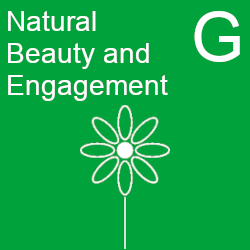Notice: From 01 December 2025, the Outcome Indicator Framework dashboard has been moved. Future updates to this publication are available on GOV.UK at: Environmental Indicator Framework.
Short Description
A growing body of research illustrated by a Defra funded Social Science Research Fellowship on the natural environment and human health and Natural England’s narrative review of reviews of nature exposure and human health and wellbeing in the UK provides evidence of how improved quality, access to and engagement with nature can impact on health and wellbeing, showing the interconnection between our own and our planet’s health. This indicator will therefore aim to show the benefits to human health and wellbeing that can be gained through England’s natural environments. This includes benefits gained from more people engaging with nature, but also more passive benefits through improvements in natural environments that may impact on human health and wellbeing (for example, improvements in air quality, climate regulation, and noise mitigation). The indicator will aim to track changes for people in disadvantaged groups and others who may benefit the most.
Readiness and links to data
This interim indicator presents data on self-reported mental and physical health benefits of nature from 2 of Natural England’s nationally representative surveys:
1) The Adults People and Nature Survey (A-PaNS) which began collecting data for adults on an on-going basis from 2 April 2020.
2) The Children’s People and Nature Survey (C-PaNS) which collects data for children twice yearly (beginning in 2021), once during school holiday-time and once in term-time.
More information on A-PaNS and C-PaNS survey methods, outputs and the full questionnaires, are available on the People and Nature Survey (PaNS) homepage.
Summary data for G7a and G7b are available in the Statistics and technical details for 2025 national indicators dataset.
This interim indicator may be superseded following an assessment of more appropriate national data to evidence the health and wellbeing implications of improvements in quality, access to and engagement with England’s natural environments.
Natural England carried out analysis to understand the health benefits gained from exposure to nature and to support the development of a potential new G7 Outcome Indicator Framework indicator. The report is available here on Natural England’s Access to Evidence website.
Notes on indicator
Adults' and children’s results are not directly comparable due to the use of child-appropriate questions in the children’s surveys.
Indicator components
Figure G7a: Percentage of adults in England reporting that time spent outdoors was good for their physical and mental health, survey years 2020/2021 to 2023/2024
Table G7a: Percentage of adults in England reporting that time spent outdoors was good for their physical and mental health, survey years 2020/2021 to 2023/2024
| Year | Health | Agree | Neither agree nor disagree | Disagree | Not applicable, don't know and prefer not to say |
|---|---|---|---|---|---|
| 2020/2021 | Mental health | 92.14 | 5.98 | 1.17 | 0.71 |
| 2020/2021 | Physical health | 93.79 | 4.45 | 1.33 | 0.43 |
| 2021/2022 | Mental health | 91.77 | 5.92 | 1.39 | 0.92 |
| 2021/2022 | Physical health | 93.47 | 4.59 | 1.30 | 0.64 |
| 2022/2023 | Mental health | 90.18 | 6.86 | 2.07 | 0.89 |
| 2022/2023 | Physical health | 92.06 | 5.28 | 2.06 | 0.59 |
| 2023/2024 | Mental health | 89.44 | 7.20 | 2.35 | 1.01 |
| 2023/2024 | Physical health | 91.94 | 5.14 | 2.07 | 0.84 |
Trend description for G7a
A-PaNS data show that the majority (ranging from 94% in 2020/2021 to 92% in 2022/2023 and 2023/2024) of adults who had visited green and natural spaces in the last 14 days agreed that spending this time outdoors was good for their physical health. A similar majority (ranging from 92% in 2020/2021 and 2021/2022 to 89% in 2023/2024) agreed that spending this time outdoors was good for their mental health.
Assessment of change
No assessment of change was undertaken for this indicator as a suitable time series is not yet available in the Outcome Indicator Framework.
Figure G7b: Percentage of children in England agreeing that being in nature makes them very happy, survey years 2021 to 2024
Table G7b: Percentage of children in England agreeing that being in nature makes them very happy, survey years 2021 to 2024
| Year | Agree | Neither agree nor disagree | Disagree | Don't know and prefer not to say |
|---|---|---|---|---|
| 2021 | 85.39 | 12.20 | 2.40 | 0.00 |
| 2022 | 87.13 | 10.42 | 2.40 | 0.05 |
| 2023 | 88.21 | 9.90 | 1.89 | 0.00 |
| 2024 | 90.90 | 7.98 | 1.13 | 0.00 |
Trend description for G7b
C-PaNS data show that the majority of children agreed with the statement that being in nature makes them very happy. It also appears that this figure has increased slightly over time, from 85% in 2021 to 91% in 2024.
Assessment of change
No assessment of change was undertaken for this indicator as a suitable time series is not yet available in the Outcome Indicator Framework.

